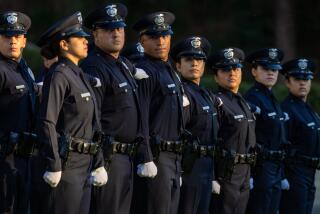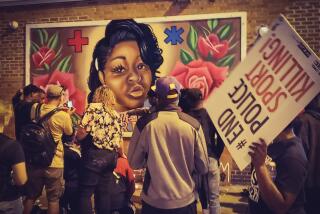Unarmed and Unwelcome in Sector East : Balkans: U.N. peacekeepers in Croatian territory feel helpless in the face of atrocities and lawlessness they encounter daily.
- Share via
ERDUT, Croatia — After 15 years of patrol work in the wilds of rural Canada, Constable Jacques Maillet thought he had seen just about every act of savagery man could inflict on his fellow man.
As a drug enforcement officer, he investigated a brutal murder-suicide by a junked-up teen-ager. Patrolling the highways, he learned to harden himself against the tragedy of whole families wiped out in gory accidents. Robberies and assaults were routine work for the vaunted Mounties.
But none of those disturbing experiences, Maillet says, prepared him for his current assignment as an unarmed and largely unwelcome policeman with the U.N. peacekeeping mission in the violent eastern Croatian territory known as Sector East.
The 34-year-old Maillet cringes as he recalls how one Serbian vigilante menacingly stuck the muzzle of his gun in the mouth of an 8-year-old boy.
Gregers Bigom, a U.N. policeman from Denmark--where it would take a decade to match the past six months’ murder toll in Sector East--retains horrible visions of a 70-year-old man beaten bloody and left on the U.N. peace mission’s doorstep because he refused to “voluntarily” abandon his lifelong home.
Even policemen on loan from Middle Eastern countries, such as Kamal Mohammed of Jordan, say they are appalled at the atrocities and lawlessness they encounter here on their daily rounds.
“Many of these men are going to need major therapy before going back to their homes,” Blandina Negga, the civilian affairs coordinator for Sector East, said of the region’s 150 foreign police monitors.
“These are Manson-style murders,” Negga said of the crimes that the civilian U.N. patrolmen are expected to investigate but have little authority to do anything about. “These are things you don’t come across but once in a lifetime, even in violent societies like the United States. Here, they happen by the dozens.”
It is the brutality of the killings and the senselessness of the deaths that gnaw at the policemen’s nerves and threaten to haunt them beyond their dangerous and frustrating six-month tours.
There have been no on-the-job breakdowns to date, but Negga and the policemen themselves concede that all the ingredients for long-term trauma are present in this volatile region.
“These are big, tough guys, but they haven’t seen much of what they see here,” said Negga, a veteran of several U.N. missions.
“We get a lot of cut throats and guttings, particularly in the Baranja area,” she said of the Serb-controlled basin between the Danube and Drava rivers near the border with Hungary. “How do you understand what’s happening when a woman is watching television and someone busts in and pumps 25 bullets into her face--not one or two, enough to kill her, but 25--just because she said she wouldn’t leave?”
The military troops of the U.N. deployment arrived in the former Yugoslav federation expecting to encounter gunfire in the daily execution of their tasks. They were provided with small arms, helmets and flak jackets and warnings that not all the combatants were pleased with their intervention.
But the policemen, plucked from civilian life, were prepared for routine liaison duties with the local police. Few realized that they would be relegated to the role of helpless spectator to gruesome crimes, many committed by vigilantes masquerading as Serbian police.
Murders are almost nightly occurrences in Sector East, where there have been more than 100 slayings since April. Most are the consequences of “ethnic cleansing,” the Serbian occupiers’ grim practice of firming up control of their seized territory by forcing other ethnic groups out. Those who resist are often confronted with escalating intimidation, ultimately with death.
Because the U.N. deployment plan drafted by former U.S. Secretary of State Cyrus R. Vance requires the U.N. policemen in the area to be unarmed, the foreigners on loan from their governments for the Yugoslav mission do not patrol the sector at night, when the worst of the harassment and violence breaks out.
After daybreak they look into the previous night’s horrors, pressing local authorities to treat the executions and expulsions as serious crimes. Because the Serbian occupational leadership is strengthened by the ethnic cleansing, the U.N. policemen’s advice often is ignored.
While the military troops of the U.N. deployment deal mostly with the warring factions, the policemen see the savage consequences of violence against innocents.
Negga sees a danger of long-term psychological trauma among the policemen, stemming from the dual hardship of frequent exposure to pointless brutality and operational restrictions that prevent the foreign monitors from getting effectively involved.
The policemen have been sent here to observe and advise local law enforcement officers, but they have no authority to intervene to deter crimes or ensure prosecution, even when the perpetrators have left an incriminating trail of evidence. In one case, a Serbian policeman left his hat at the scene of his crime.
“Our jobs here are very difficult. In Jordan, policemen have authority, while here we have none,” Mohammed said. “We are policemen. We like to catch the criminals. Here we are not allowed to, and that is very frustrating. Even when it is clear who is guilty, we see no attempt at punishment.”
For officers of the law from serene Scandinavia, the contrast is disturbing and the diplomatic shackles are a constant aggravation.
Bigom, a drug enforcement specialist from Copenhagen, recalls with a trace of anger the helplessness he felt during recent attempts to negotiate a prisoner exchange in Bosnia-Herzegovina, when Serbian vigilantes stopped the armored vehicle in which U.N. policemen were traveling and threatened to rape and kill the female translator assisting them.
“They just grabbed her and announced they were going to take her because she happened to be from the wrong side at this particular checkpoint,” Bigom said. “Even with 15 years of experience, I was shocked at that. We are supposed to be police officers, yet when we are threatened, we are unable to do anything about it.”
A local Serbian commander happened on the scene and persuaded the rebels to let the translator go, the Danish policeman said, wondering aloud what might have happened if fate hadn’t intervened.
Larry Moore, head of the eight-man Royal Canadian Mounted Police contingent directed from Erdut, said Mountie headquarters recently sent each of its men in Yugoslavia an information packet alerting the civilian peacekeepers to the warning signs of emotional stress. Ottawa also has reminded its policemen of psychological counseling available upon their return.
But Moore said he doubts that many of the Mounties would seek professional help voluntarily, conceding that he personally felt some stigma attached to seeing a psychiatrist.
“It’s such a non-exact science,” Moore said, pointing to experience in courtrooms where psychologists testifying as expert witnesses often argue polar-opposite views for prosecution and defense. “But I guess if you want to catch the guys who are having problems, you’re going to have to screen everybody.”
Maillet, a French Canadian who spent much of his career in the Maritime Provinces, was shaken by a mid-October bombing incident in which he came close to being blown up. As Maillet waited outside, the Serbian friend of an expelled Croatian family entered the family’s home, saying he needed to fetch something. Moments later, the man was shredded by a bomb--one that he either encountered in the house or was setting himself in an attempt to booby-trap the premises.
“In Canada you saw a lot of traffic accidents that were terrible, but they were accidents,” Maillet said. “Here, what gets to you is the cause. Someone gets killed here because he’s different. The cause of death is being a Serb or being a Croat, people you can’t even distinguish from one another.”
A Patrolman’s Nightmare
Police officers with the U.N. peacekeeping mission in the eastern Croatian territory known as Sector East say they are appalled at the atrocities and lawlessness they encounter on their daily rounds.
More to Read
Sign up for Essential California
The most important California stories and recommendations in your inbox every morning.
You may occasionally receive promotional content from the Los Angeles Times.














